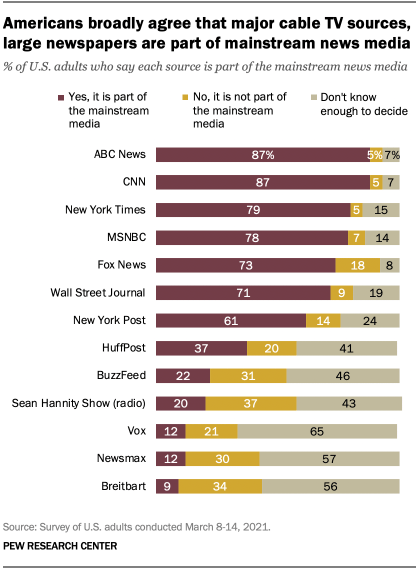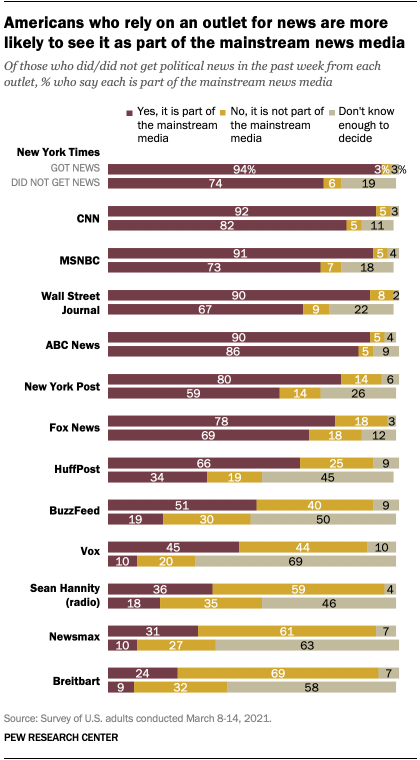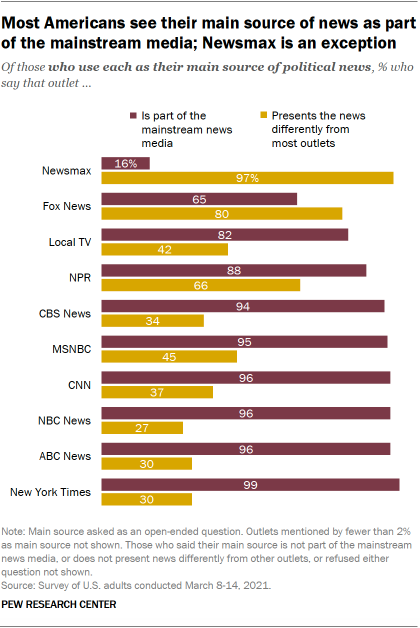The term “mainstream media” has long been used to refer to established journalism outlets in the United States. In recent years, it has also been used in a more critical context, including by former President Donald Trump, other politicians and members of the media themselves.
To learn more about how Americans think about the term, Pew Research Center asked a representative sample of U.S. adults whether they consider each of 13 different news outlets to be a part of the mainstream media or not. The outlets were selected to represent a range of audience sizes and sectors.
Pew Research Center conducted this study to understand how Americans connect different outlets with the idea of the mainstream news media.
We surveyed 12,045 U.S. adults from March 8 to 14, 2021. Everyone who completed the survey is a member of the Center’s American Trends Panel (ATP), an online survey panel that is recruited through national, random sampling of residential addresses. This way nearly all U.S. adults have a chance of selection. The survey is weighted to be representative of the U.S. adult population by gender, race, ethnicity, partisan affiliation, education and other categories. Read more about the ATP’s methodology.
In the survey, respondents were asked in an open-ended question to volunteer their main source for political news. This allowed respondents to name any source, not limiting them to the specific ones asked about in other survey questions. If respondents volunteered more than one source, the first one mentioned was accepted.
Researchers grouped these open-ended responses together by brand; for instance “NY Times,” “NYT” and “nytimes.com” would all be counted as indicating that The New York Times was the respondent’s main source. Additionally, individual local news sources were grouped together into categories such as “local newspapers” and “local TV.”
In the question that asked respondents which of a list of outlets they consider to be a part of the mainstream news media, outlets were selected from a list of 25 outlets used in a content study of political news coverage (the same list was used in the survey for use of political news; find details about outlet selection here). Outlets included in the question about the mainstream news media were selected to represent a range of audience size and original platform (i.e., television, print, digital or radio).
This is the latest report in Pew Research Center’s ongoing investigation of the state of news, information and journalism in the digital age, a research program funded by The Pew Charitable Trusts, with generous support from the John S. and James L. Knight Foundation.
Here are the questions used for this report, along with responses, and its methodology.
Overall, a majority of Americans consider seven of these outlets to be part of the mainstream media. That includes the one national network news outlet included in the analysis (ABC News), all three major cable news outlets asked about (MSNBC, Fox News and CNN) and three legacy print publications: the New York Times, the Wall Street Journal and the New York Post.
The remaining six outlets in the survey – five of which began as digital entities – draw different responses from the public, with a plurality or majority of Americans saying they don’t know enough to decide whether each one is part of the mainstream media or not. Nearly two-thirds of adults (65%), for example, say they don’t know enough to decide whether Vox is part of the mainstream media, while majorities say the same about Newsmax (57%) and Breitbart (56%).
Americans are slightly more likely to say HuffPost is part of the mainstream media than not part of it (37% vs. 20%), while the reverse is true for BuzzFeed (22% vs. 31%) and the Sean Hannity radio show (20% vs. 37%). Still, pluralities say they don’t know enough about each of these outlets to decide.
The survey also asked respondents which of these sources they turned to for political news in the past week.
Respondents who use an outlet for political news are more likely to say that outlet is part of the mainstream media than those who don’t turn to it. For example, 92% of those who got political news from CNN in the past week consider the cable network part of the mainstream media, compared with a smaller share of those who didn’t get political news from CNN (82%).
For some sources, these differences are dramatic. Those who use HuffPost for political news are about twice as likely as those who don’t to say the outlet is part of the mainstream news media (66% vs. 34%). And about a third of those who use Newsmax for political news say it is part of the mainstream media (31%), compared with just 10% of those who don’t use it for news.
Many of these differences are attributable to familiarity with the outlet. For example, 63% of those who don’t turn to Newsmax for political news say they don’t know enough about the outlet to decide whether it is part of the mainstream media or not.
Notably, while the term “mainstream media” has been used in many partisan contexts, there is wide agreement between Republicans and Democrats about whether the outlets in the survey are part of the mainstream news media or not.
One example is Fox News, which often has commentary about the mainstream media in its opinion content. Three-quarters of Republicans and Republican-leaning independents see Fox News as part of the mainstream media, as do 72% of Democrats and Democratic leaners. Some partisan differences do emerge in views of smaller outlets. Republicans, for instance, are twice as likely as Democrats to say Newsmax is part of the mainstream news media, though only small minorities in both parties say this (16% vs. 8%).
Americans’ views of their main sources of news
In addition to asking Americans whether they got political news from various outlets in the past week, the survey also asked respondents in an open-ended question what their main source of political news is. The Center then asked them to decide whether their mainsource of news is part of the mainstream media or not – and whether they think that source presents news differently from most outlets.
Of the main sources named by at least 2% of the public, some interesting distinctions arise. Newsmax stands out because a majority of those who name it as their main source say it is not a part of the mainstream media (84%); only 16% say it is. What’s more, 97% say Newsmax presents news differently than most news organizations.
A different dynamic emerges around Fox News and NPR. About two-thirds of those who say Fox News is their main source for political news (65%) see the network as part of the mainstream media. The same is true of 88% of those who name NPR as their main political news source. Yet majorities in both groups – 80% of those who turn mainly to Fox News and 66% of those who turn mainly to NPR – say each outlet presents news differently than most outlets.
Large majorities of those who turn mainly to other outlets for political news – including local TV, network TV, the other two major cable TV sources (CNN and MSNBC) and The New York Times – see these outlets as part of the mainstream news media, and majorities also say these sources do not present news differently than most news outlets.
Meera Ramshankar provided assistance in open end coding.
Note: Here are the questions used for this report, along with responses, and its methodology.








